Liberty Index Survey Summary
American Freedom Alliance
Liberty Index Survey
In support of AFA’s Liberty Index Initiative, a survey was sent out to the AFA community where 21 different attributes were listed, and respondents were asked to rate each attribute as something that a school MUST not have, PREFER not to have, Doesn’t matter, SHOULD have and MUST HAVE. This range indicates not only a negative, positive or indifferent opinion, but also how strongly the respondent feels.
The same attributes were asked for high school and middle school, and they included characteristics that have to do with curriculum, skills and overall ethos.
Each of the 21 attributes was given a “desirability score” based on a composite of all the responses.
Those attributes with a score above 75 will be part of our preliminary group of Liberty Index criteria, as will those with a score below -75.
Respondents
Sixty two individuals from the AFA community responded to the survey. Of these, 52% were parents, 43% grandparents, 11% teachers, 1.6% administrator, and 8% were students.
38% also indicated “other.” Their descriptions are in Appendix A. As respondents could of course fall into more than one category, the total is greater than 100%.
Desirability Score
For both the high school and middle school cases, respondents were asked to “rate the following in terms of how important you think each of these is to provide the best liberty-oriented education for children today.”
As noted above, the response options for rating each attribute were MUST HAVE, SHOULD have, Doesn’t matter, Prefer not to have, or Must Not have.
Each of these was then given a weight:
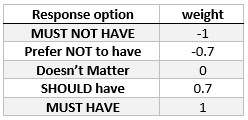
Table 1: Category Weights
These weights were then applied to the percent of responses in each category for each attribute, then added up to form a combined desirability score. For example, if 100% of all respondents indicated that saying the Pledge of Allegiance was something a school MUST have, its score would be 100, but if 50% responded that schools MUST have it and 50% said they SHOULD have it, that drops to an 85 (50 + 0.7*50 = 85). Similarly, if 100% said that schools MUST NOT place an emphasis on victimhood, then its score would be -100. And if any attribute were something everybody felt indifferent about, its score would be zero.
The Desirability Score was calculated for both the High School Responses and Middle School responses, and, not surprisingly, both showed the same attributes as positive or negative, with a slight variation in relative desirability.
The following graphs and analyses were done of a data set of these 62 responses.
The High School Desirability Scores
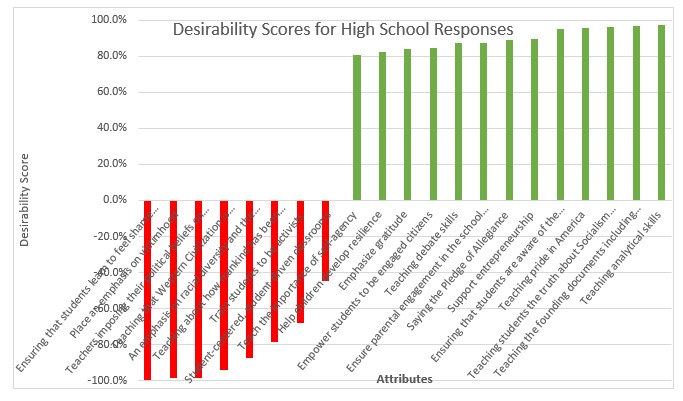
High School Desirability Scores
A few things are apparent from this graph. First, the range of desirability scores is much smaller for the positive attributes than the negative, indicating more agreement on the importance of a school having a characteristic than not. Second, all of the attributes have a score of at least +80, or at most -45, indicating little real indifference and/or mixed feelings about any of these. Of course, this isn’t a surprising finding given the attributes offered. The most ambiguous of them all was the one that is the grayest in terms of interpretation: student-centered, student-driven classrooms. This was a real outlier and drew a number of comments indicating how it could be interpreted a number of ways. (See Appendices B and C for comments)
Table 2 has each attribute with its score.
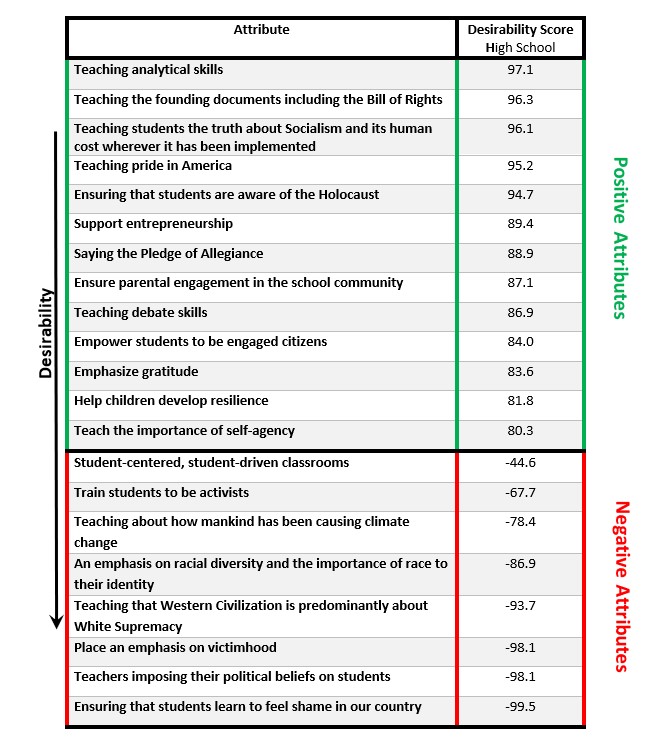
Table 2
Desirability Score – High School
The table shows the attributes listed from most to least desirable based on their scores, with those in the green-marked area being the positive ones, and in the red area are the negative ones. There are no surprises regarding which is positive and which negative, but the relative desirabilities are interesting to note, in particular how students learning shame is the least desirable attribute a school can have, with victimhood and teacher-imposed beliefs a very close second. The relative scores among the positive ones are interesting as well. Some of the main points are summarized here:
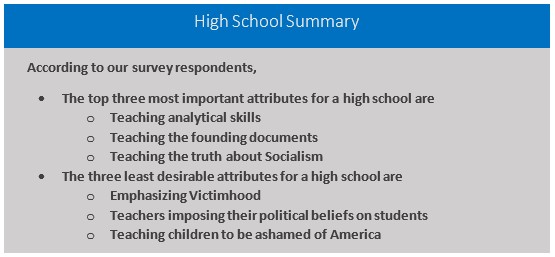
Before moving on to the Middle School data, it’s worth pausing for a moment to reflect on these responses and the quality of the AFA community that provided them. Would the public at large provide similar responses? It is doubtful. In addition, let’s consider how the variability among respondents, and between the AFA community and others, argue for the importance of school choice. The Liberty Index itself is being created to provide the best guide for parents to find a school that best matches their academic and ideological views, something relevant only where such choice is possible.
Middle School
The Desirability Scores for the Middle School attributes aren’t much different from those for the High School.
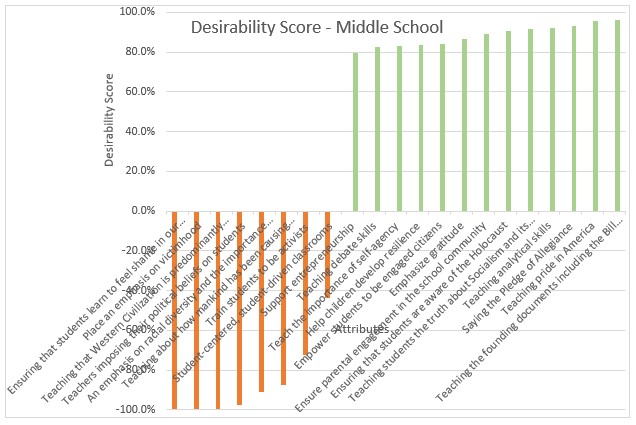
Middle School Desirability Scores
From this graph it’s apparent that, as with the high school case, there is greater divergence among the negative attributes than the positive ones, with, again, the student-centered, student-driven classrooms being the most ambiguous or, put another way, the least undesirable.
Table 3 has the desirability score for each attribute
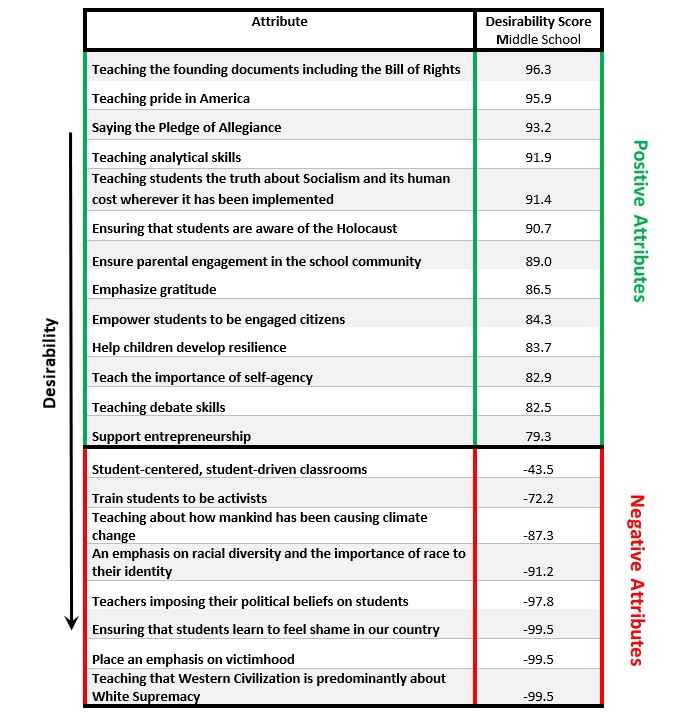
Table 3
Desirability Score – Middle School
The main points are summarized here:
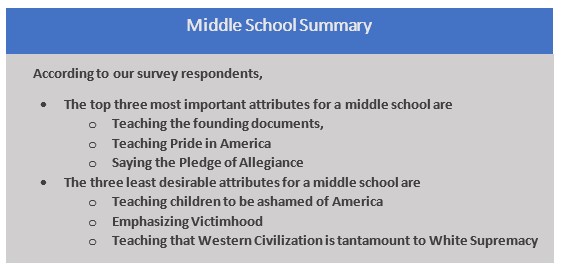
And note especially that the three least desirable attributes are all equally undesirable, with near unanimity bringing them each to a score of -99.5.
Comparing Middle School to High School
Table 4 offers a more formal comparison of Middle School Desirability Score Rankings to High School ones.
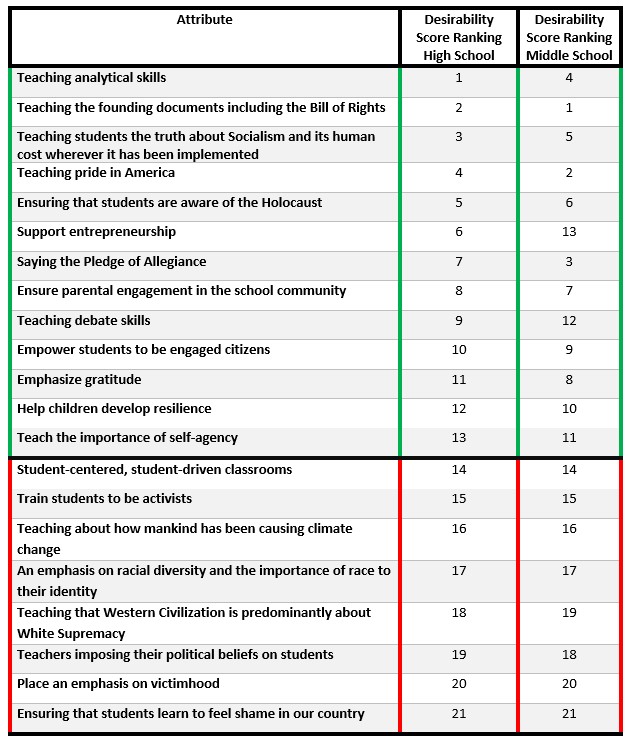
Table 4
Comparing High School and Middle School Score Rankings
There were no attributes that crossed over from positive to negative, or the reverse, between high school and middle school. There was greater agreement in ranking with the negative attributes than the positive, but in general there was little difference. Below is a summary of the primary differences, none of which is surprising.
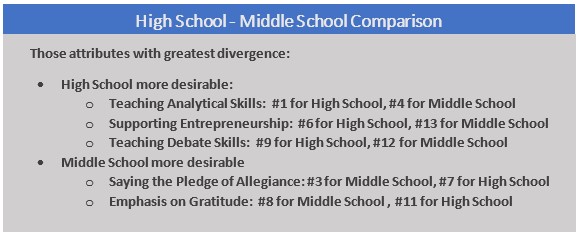
Liberty Index criteria
We used this survey to create a preliminary set of criteria for our Liberty Index, and these will be used as a set of metrics against which to assess schools. Those attributes which had a Desirability Score of 75 and above will be included in our Positive Criteria list, and those with a Desirability Score of below -75 will be in our Negative Criteria list. These are, then:
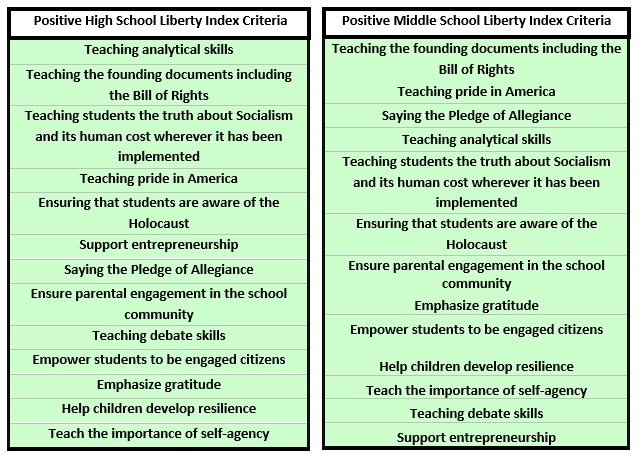
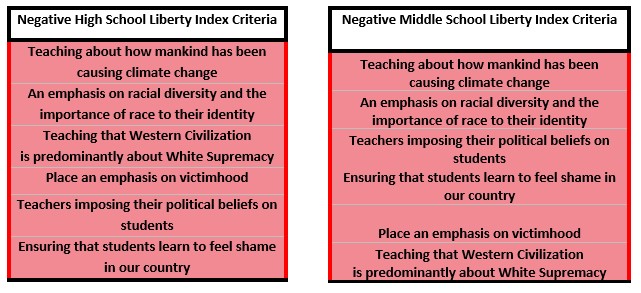
Conclusion
In the opinion of the AFA community, which is naturally a freedom-oriented, America-loving, Western-Civilization-admiring group of people, attributes that relate to pride, empowerment, responsibility, facts, and history that informs rather than deceives are seen as crucial, and those that undermine, shame, infantilize, and that impart dishonest and deceitful views of science and history are to be avoided. There is little difference in what the community sees as desirable in high school vs. middle school, and it’s important to note that there’s a degree of variability among the responses, particularly in the case of the negative criteria. The comments shown in Appendices B and C also reflect a wide range of views.
We might presume that, if this survey were offered to the public at large, some of the responses would lead to quite different desirability scores; on the other hand, it’s difficult to imagine a parent choosing to have his or her child be inculcated in shame and victimhood, or not learn about the Holocaust. In any event, what these results show is an argument for the ability for parents to select schools according to whatever criteria they choose, and to choose liberty and empowerment if those are important to them.
Thank you
Thank you to our AFA community for participating in this first step towards empowering parents to provide for their children an education that best suits their ideological and academic goals, and that helps guide schools towards being the most liberty-oriented they can be… if they so choose.
Appendix A
Respondents
Respondents were comprised of:
parents: 52%
grandparents: 43%
teachers: 11%
administrators: 1.6%
students: 8%.
38% also indicated “other.” These were:
Retired Teacher (2) ; Retired/Entrepeneur; retired J.D.; physician; Adult American Citizen; Business; Concerned Human Being; Concerned patriot; Former high school U.S. History; Economics; and Government teacher.; retired engineer and consultant; retired college prof; grandchildren grown and already graduated from college; A supporter of truth and sound education; Concerned about the dangers of socialism being taught in schools; politically & civically active and still tutoring; Grandpa in seven months!; None of Above; Retired No Children; retired teacher/concerned citizen; Citizen, Church and Schools Council Member; Education expertise: design/manage strategic philanthropic portfolios for K-12 & higher ed
Appendix B
Respondents’ Comments regarding the High School section
Regarding Religion
Allow prayer in the schools
Bring God back into the schools
Patriotism
It is important to foster patriotism; for students to learn to sing our national anthem, and to stand for it as well as the Pledge of Allegiance.
Basic skills and curriculum
ensuring students learn basic fundamental skills to ensure their ability to function in society, earn a living, and think for themselves.
Require course on American history and reinstate a required, formal course in Civics (American government). For the latter, teach that we are a democratically elected REPUBLIC, not a democracy. Explain why the Electoral College is important and must not be eliminated. Emphasize they have an obligation to vote when they become of age. Get rid of all LGBTQWXYZ indoctrination and teach that, biologically, there are exactly TWO genders and explain the reason for the two genders. Only for languages can there be three genders: M, F, N. Get rid of Common Core!
Regarding the idea of man-made climate change: Students should be aware of this theory and of other theories related to climate.
Math and science, phonics, spelling, grammar, critical thinking skills, sports. I believe the current teachers are the result of the education they have experienced. We have let this slide through two generations, we are seeing the results. Not sure it is reversible.
Schools must teach students Critical Thinking!
The schools need to start looking at kids as individuals. Find their strengths and teach them things that will interest them and move them toward careers. Not all kids need Calculus. Teach them life skills such as How to balance their budget, How to invest. Things that will make a difference for good in their lives.
Man has little, if any, influence on the Earth’s climate. Teaching lies is not right. How can we humans get along together if we are not taught respect for our fellow man and that all men/women are created equal?
Other
Shoot the marxists.
A School-Board that is answerable to the parents, and not have the authoritarian attitude of a dictator…
I personally believe that public education at this point is so broken and corrupted that it is irredeemable. It should be dismantled and replaced with exclusively private education.
I want the students to be taught by Conservatives and taught the logic and value of Conservatism. If that’s “imposing” the political beliefs of the teachers on the students then I am OK with it. Having teachers model behavior is needed.
Re climate change, students should learn views across the political spectrum, understanding that ecological responsibility is not political, has been around for decades, and actually dates back to the Bible. “Student-centered and driven” are broad terms; of course, classes should be student-centered – that’s why they exist – but I don’t know what “student-driven” means. Teachers run classes because they’re more mature and knowledgeable, right? Re teaching students to be activists: maybe that should be left to parents. The main purpose is still to teach reading, writing, math, and history. Other than love of country(which has unfortunately become controversial), and modeling courtesy and good manners, I believe ideology should be left to parents.
Appendix C
Respondents’ Comments regarding the Middle School section
Regarding Religion
Put God back into schools
Basic Skills and Curriculum
Kids need to be looked at as individuals and taught things that strengthen push them towards an actual career. Life skills like Budget, investing. Not all kids will need Calculus. I think we need to teach kids things that they are interested in so they don’t just tune out.
I think it is important to teach interpersonal skills. Too many students have been “glued” to their mobile phones and computers so that they have difficulty getting along with real people in their own age group as well as their elders.
I do not understand what you mean by “student-centered, student drive classrooms.” Emergent curriculum is highly successful in pre-school and lower grades (K and 1st perhaps others) to kindle students’ interest. However, older students must adapt to following directions and doing assignments which they do not necessarily enjoy.
Students in the middle school age are developing some skills to be able to do some “student-driven” activities, but this is better used on the high school level, and only if it is done in limited fashion with guidelines and pre-instruction.
Resilience should emphasize adaptability, planning, analytics, self reliance, level headedness and other executive management skills.
School must teach students Critical Thinking!
Student Life
Shorter days for elementary school . Longer days for 7th to 12th grade Pledge of allegiance and national anthem assembly on Monday morning at the beginning of the school week in assembly like fashion with the high grades students raising the American flag.
The pledge of allegiance at Jr. High and High school level should not be required at the beginning of each class, but should be included for special occasions: assemblies, sports events and graduations.
The answers to the Highschool survey apply to all grades at the level of their understanding. We need to identify as Americans if we want to enjoy the benefits of living in this country. We need more affordable private and Charter schools. The government should subsidize schools that educate and defund schools that do not, particularly in underserved communities.
Overall:
I want the students to be taught by Conservatives and taught the logic and value of Conservatism. If that’s “imposing” the political beliefs of the teachers on the students then I am OK with it.
Having teachers model behavior is needed.
Taxpayer dollars should follow the child allowing parents free agency No taxpayer-funded govt educational unions (and if they exist both membership & payments should be voluntary only AND should NEVER be collected by the government via paycheck deduction, etc.)




